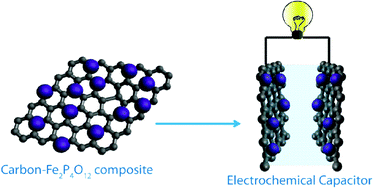Fe2P4O12–carbon composite as a highly stable electrode material for electrochemical capacitors†
Abstract
Supercapacitors are important energy storage devices for high power applications. Carbon materials, metal oxides and conducting polymers have been known to show capacitive charge storage but transition metal phosphates are not as well-known as electrode materials in supercapacitors. In this study, an iron cyclotetraphosphate (Fe2P4O12)–carbon composite has been synthesized and demonstrated as an electrode material for supercapacitors. The Fe2P4O12–carbon composite has been thoroughly characterized by X-ray photoelectron spectroscopy, Raman spectroscopy, X-ray diffraction, electron microscopy, etc. The composite shows predominant capacitive behaviour only in acidic medium; its charge storage properties are relatively poor in alkaline medium, indicating the important role of H+ in the charge storage mechanism. The composite shows a capacitance of 251 F g−1 at a current density of 1 A g−1. The composite is highly stable in 0.5 M H2SO4 and does not show any apparent capacitance loss after 9000 charge–discharge cycles recorded at a current density of 5 A g−1.



 Please wait while we load your content...
Please wait while we load your content...